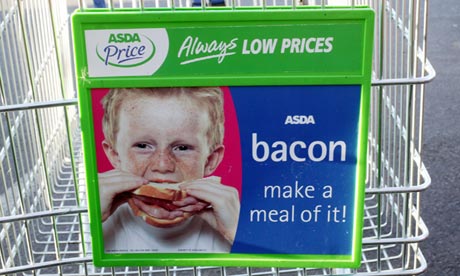
The UK's poorest households are being disproportionately hit by the impact of soaring food prices, according to new government figures that also show the consumption of every major nutrient has fallen in the last four years.
In order to cut costs since 2007, UK households have bought less bread, lamb, beef, fish, fruit, vegetables, potatoes and alcoholic drinks – but more bacon.
The government's annual Family Food survey, which provides the most detailed annual snapshot of food and drink spending and consumption, found that weekly spending per person on all household food in 2011 was £27.99, an increase of 1.5% on the previous year. But because of price rises, that bought less food - 4.2% less in 2011 than in 2007.
The survey also showed how households saved 6.8% by "trading down" to cheaper – and in many cases, less healthy – products, hitting consumption of fresh fruit and vegetables.
The poorest have been hit hardest by price rises. One pound in every six of household expenditure for the poorest 20% went on food, compared with one in nine for all UK households.
Which? executive director Richard Lloyd said: "Household budgets are under enormous strain, and our research has shown more people shopping at discount supermarkets and one in four planning to cut food spending in the next few months.
"One in six people say rising food prices are making it difficult to eat healthily, so we want to see a more ambitious approach from government and the industry to help people make healthier choices."
The report finds further evidence for a "nutritional recession", with rising food prices and shrinking incomes driving up consumption of fatty foods and reducing the amount of fruit and vegetables we buy.
Among the poorest members of society, consumption of every major nutrient has fallen between 2007 and 2011, while energy intake from alcohol has risen by 18% over the same period. By contrast, among the richest tenth of the population, alcohol consumption has fallen by 3% since 2007, while intake of nine of the 20 nutrients has risen or stayed roughly the same.
From a peak in 2006 and 2007, purchases of fruit and vegetable were 10% lower in 2011 than 2007 for all UK households, 22% lower for households in the second lowest income group, and 15% lower for the poorest. And consumption has fallen in line with income. The poorest 10% consumed an average of 107g of fruit per day, equivalent to only just over one portion. By comparison, the highest-earning 10% consumed 227g per day.
The report also finds that eating out has been in decline, with a surprising negative impact on health. Energy intake from eating out was 4.9% lower in 2011 than in 2008, due mainly to reductions in free school meals and work-provided meals.
A Defra spokesperson said: "We take rising food prices very seriously and understand the pressure it puts on families' budgets. The government is helping the most vulnerable in society afford and have access to nutritious food.
"We give school pupils free fruit and veg, and help pregnant women and new mums on the lowest incomes buy essential foods. We are working to keep the global food market stable, helping families get their food at the best price."
But consumer groups said the government should be doing much more to help the most hard-pressed social groups eat more healthily. Malcolm Clark, co-ordinator of the Children's Food Campaign, said: "With nutrition trends continuing to go the wrong way, especially amongst lower income households, how much longer will the government rely on half-measures and a failing leave-it-to-industry approach?"
"Given widely held concerns about the weakness of the (voluntary) Responsibility Deal, we have little confidence that the latest pledges on increasing fruit and vegetable consumption will have much impact, especially whilst retailers and manufacturers continue to heavily promote junk food and sugary drinks."

